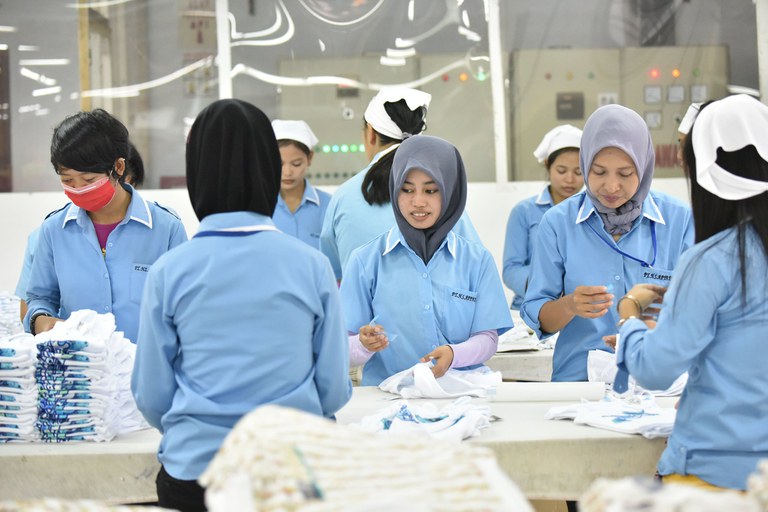What's going on in Indonesia: Growing awareness of sustainability amid lingering pandemic impacts and a changing legal environment
Recently, Indonesia has undergone one of the most significant changes in its labour law, enacting Law Number 11 of 2020 on Job Creation. Can you briefly tell us what the law does, and how it affects the garment and textiles sector?
With the job creation law, the government tried consolidating 77 laws into one. The main goal was to attract more investors to Indonesia, as the law is more business-friendly which provides simpler regulations for employers to “easy hiring, easy firing”. There are, however, adverse effects on workers. Currently, the law offers employers more flexibility in contracting and a simpler minimum wage calculation.
Of course, it is easier for employers to predict the amount of the minimum wage for the next year, as the law already contains a formula that allows them to plan their budget better. Still, from the workers' point of view, this is not optimal. That’s why there have been many critical voices.
Why is this not optimal from the workers' point of view?
Several changes introduced by the Job Creation Act are de-regulatory or promote flexibility. What is beneficial to employers is often adverse to workers. For example, longer terms for employment contracts to become permanent, broader outsourcing opportunities, reduction of severance payments, and an increase in the maximum allowed overtime hours per week. New exemptions for micro and small businesses include the exemption from paying the minimum wage.
These are all significant changes that are likely to impact on worker protection in Indonesia profoundly and have generated much opposition and critical commentary from the trade union movement and its supporters in Indonesia and abroad.
In its latest report, Fair Wear lists the most common risks and violations of labour rights in garment factories in Indonesia. What are these?
The central risk concerns freedom of association, which contributes to social dialogue and collective bargaining. Currently, not many garment factories have independent unions, while those who do have limited skills to negotiate their rights.
In Indonesia, a company can a have a SPTP, a non-affiliated trade union on the factory level. This type of trade union doesn’t work well to improve working conditions, as it’s usually led by management and focused merely on meeting audit compliance.
Another point is the low number of collective agreements, less than 15% for the whole sector. This doesn’t empower "social dialogue," leaving workers unable to stand up for their rights. Being a trade unionist can risk losing employment, as contracts often don’t provide future income security. As you know, contracts in the garment industry are short-term, guaranteering only about three to six months of employment on average. It's all interrelated.
So its rather rare that companies give long term contracts?
One-year contracts are the exception.
Are there any other common risks or violations you would list?
We also uncovered that overtime work calculations often don’t consider excessive working hours. Based on national regulation, the overtime pay for workers can be as twice, third or even more if they are working in the public holiday. But unfortunately it is not calculated fairly since the workers in reality can work more than 8 hours but they are not paid with overtime. In Indonesia, full-time employment equals 40 hours. The limit of overtime hours used to be 14 hours, but has been increased to 18 hours following the Job Creation law.
You joined Fair Wear in Indonesia in 2016. From your perspective what has visibly improved in the area of grievance mechanisms over the last six years?
We’ve had some significant successes since I joined. Once, a factory went bankrupt and didn’t pay its 2,000 workers for four months. We made sure that our member brands contributed to this payment based on their leverage, collecting more than 25,000 Euros to distribute among the 2,000 workers.
Another factory fired 12 trade unionists. We then cooperated with another organisation and brands to pressure the factory, which ultimately rehired the trade unionists. This remains the exception, however.
Are brands and manufacturers more aware of grievance mechanisms than they were six years ago, or do you feel that they are obligated to do so because it is expected?
I notice that more and more factories have internal grievance mechanisms. Unions are more aware of existing systems, how they complement each other, and how to use them – including external grievance mechanisms from organisations like Fair Wear. Local unions sometimes cooperate with NGOs and international unions on grievance cases. Regarding internal grievance mechanisms in factories, I think much improvement needs to happen there. The facilities exist, such as complaints helplines, suggestion boxes or the complaints can be submitted directly to the factory internal complaint system. There is, however, no safe space around these facilities that would make workers feel comfortable and worry-free to file complaints, especially if the latter concern their supervisors.
What do you mean with the term “safe space”?
The question is how to give workers confidence and trust that they can file a complaint without fearing negative repercussions regarding their employment, and not intimidate them while filing complaints. This doesn’t necessarily mean that complaints need to be managed by a third party, as long as the implemented mechanism makes workers feel safe. For example, sharing their complaints anonymously or through WhatsApp, which is the most used application at the moment.
I also believe that the company should employ one or two dedicated people with knowledge of gender and inclusion. Usually, the complaints team in the factory consists of the management, while it would be more effective for it to include worker representatives, local leaders, and labour experts.
In your opinion, which sector stakeholders are most influential in the development of sustainable grievance mechanisms?
Brands have a direct influence on their suppliers through both mandatory audits and their purchasing practices. Government mechanisms often have limited resources to handle all disputes. This needs to be improved through the development of labour laws, the capacity building of labour inspectors and the local labour office.
You have conducted audits and trainings for Fair Wear in the past. What are the most important lessons you drew from this time?
I’ve seen that the factories which produce for large international brands and are part of Better Work have more knowledge of how to follow the standards. We also get strong results when we train employee representatives to conduct surveys themselves. Through these surveys, they gather input from employees to present to management. This is where we see a lot of positive change.
For this training to be effective, it's important to build and strengthen the communication between workers and management that leads to constructive social dialogue. It's about enabling unions and employee representatives to use more data to strengthen their negotiations or their bargaining position or to stand up for their rights.
Do you share the view that most of the heavy shift of sustainability is being put on the shoulders of manufacturers?
Yes, there’s a clear power imbalance between manufacturing companies and brands: We’ve observed that while standards for suppliers are becoming stricter, brands’ payments to factory often remain the same. This development means that other regulations, such as minimum wages, are more challenging for suppliers to meet. Eventhough the business benefited brands but most of the responsibility lies with the factories since they employ high number of workers.
The COVID-19 pandemic severely disrupted the garment and textiles sector in Indonesia, and led to the highest unemployment levels in a decade. What is the current situation and how has the industry coped and adapted?
The garment and textiles industry in Indonesia is on the road to recovery, though not at 100 % yet. A positive development is that workers are being rehired. However, the current global economic situation, with inflation and rising food and energy prices, is still affecting factories. Most people no longer prioritise buying clothes, leading to a significant reduction in orders. Times remain difficult for factories and workers.
The pandemic has also highlighted existing inequities, systemic vulnerabilities and challenges in global garment supply chains. What are the key recommendations Fair Wear has for brands and retailers to tackle these issues?
Fair Wear has many guidelines that show members how they can maintain good purchasing practices under challenging situations: For example, continuing production, signing long-term contracts, and placing orders in advance. We also create country-specific health and safety guidelines and conduct surveys of factories and workers that show where improvement is possible. In the end, it remains the responsibility of our member brands to adjust their purchasing practices.
Considering the lingering effects of the pandemic and the changing legal landscape in Indonesia, what are the key recommendations you would give to manufacturers, brands and trade unions to be more resilient for the future?
I think that it’s critical to strengthen the dialogue between brands, manufacturers, and workers. There also must be more freedom of association for workers to come together and express their needs. Through open communication, stakeholders can identify their challenges and find a solution together. After all, all stakeholders want to continue the working relationship, in a way that benefits each of them.

About Amalia Falah Alam
Amalia joined Fair Wear in 2016 as the Country Representative and Complaint Handler for Indonesia. In addition to coordinating and implementing activities in Indonesia, Amalia specifically focuses on lobby and advocacy towards labour-related policies at national and garment sectoral level. With the new roles as Country Manager since 2022, she also supports brands in Human Rights Due Diligence.

